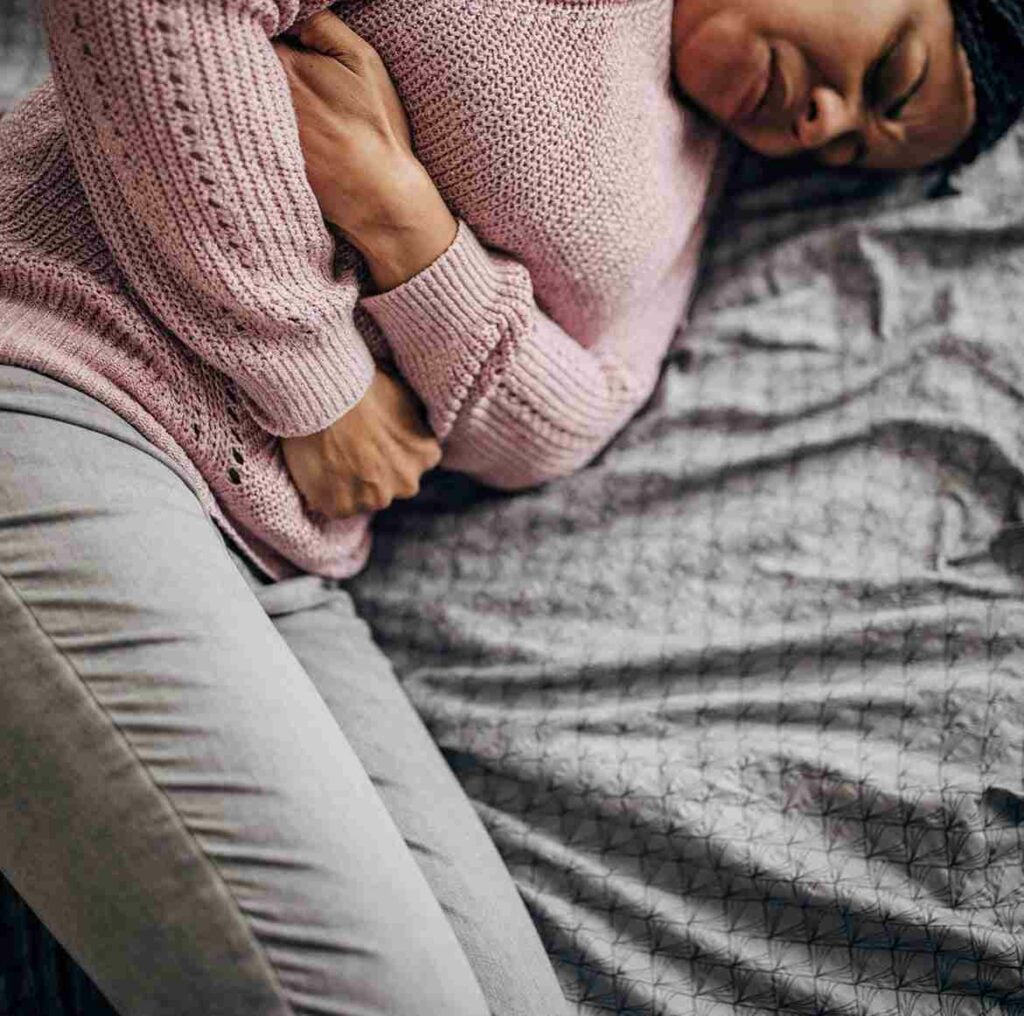For many women, the onset of their menstrual period can bring a slew of uncomfortable symptoms, from mood swings to bloating. Yet, an often overlooked symptom that many women experience is hip pain. This can range from a dull ache to sharp, debilitating pangs. While it’s not a topic that’s commonly discussed, understanding the causes, implications, and potential remedies for hip pain during menstruation is essential for any woman who suffers from it. In this blog post, we’ll delve deep into this often-misunderstood symptom, shedding light on its origins and offering solutions to ease the discomfort.
Contents
Why Do My Hips Hurt During My Period?
 Hip pain during menstruation can be a perplexing and uncomfortable symptom for many women. While it’s not discussed as frequently as other menstrual discomforts like cramps or bloating, it’s not uncommon. There are several reasons why you might experience hip pain during your period:
Hip pain during menstruation can be a perplexing and uncomfortable symptom for many women. While it’s not discussed as frequently as other menstrual discomforts like cramps or bloating, it’s not uncommon. There are several reasons why you might experience hip pain during your period:
1. Hormonal Fluctuations
The menstrual cycle is driven by changes in hormones, notably estrogen and progesterone. These hormonal fluctuations can cause ligaments in the pelvis to become laxer. The more relaxed ligaments can lead to joint instability, causing pain, particularly in weight-bearing joints like the hips.
2. Prostaglandins
These are chemicals produced by the body, and they play a significant role in the menstrual cycle. High levels of prostaglandins can cause uterine contractions. Eventually, leading to menstrual cramps. Sometimes, these cramps radiate and are felt in the hips and lower back.
3. Position of the Uterus
Some women have a uterus that tilts backward (retroverted uterus) instead of forward. This positioning can place pressure on the spine and pelvic muscles. And, leading to referred pain in the hips.
4. Endometriosis
This is a condition where tissue similar to the uterine lining grows outside the uterus. If this tissue grows in or around the pelvic region, it can cause significant pain during menstruation, sometimes radiating to the hips.
5. Muscle and Ligament Strain
The muscles and ligaments in the pelvic region can become strained or tense during menstruation. This is leading to pain in surrounding areas, including the hips.
6. Other Pelvic Conditions
Conditions like pelvic inflammatory disease (PID) or ovarian cysts can also lead to pain in the pelvic region. That might be felt in the hips.
7. Bloating and Constipation
Some women experience bloating and constipation during their period, due to hormonal changes. This can lead to discomfort and pressure in the pelvic area, sometimes causing hip pain.
If you consistently experience hip pain during your period and it’s impacting your quality of life, it’s essential to discuss your symptoms with a healthcare professional. They can help determine the cause of the pain and suggest appropriate treatments or interventions.
How To Differentiate Between Common and Serious Hip Pain During Period?
 Differentiating between common and serious hip pain during menstruation is crucial for ensuring that any underlying issues are addressed timely. Understanding the nuances between these two types of pain can help in identifying when to seek medical attention. Here’s a breakdown:
Differentiating between common and serious hip pain during menstruation is crucial for ensuring that any underlying issues are addressed timely. Understanding the nuances between these two types of pain can help in identifying when to seek medical attention. Here’s a breakdown:
Common Hip Pain
- Mild to Moderate Intensity: The pain may be annoying but generally doesn’t disrupt your daily activities.
- Duration: Typically lasts only for a few days, peaking around the start of the menstrual cycle and subsiding as the period progresses.
- Nature of Pain: Dull, achy discomfort that may be accompanied by a feeling of heaviness.
- Predictable Pattern: The pain is consistent with previous menstrual cycles.
- Relief with Home Remedies: Simple measures like over-the-counter painkillers, warm baths, gentle stretches, or applying a heating pad provide relief.
Serious Hip Pain
- High Intensity: The pain is severe and disrupts your daily activities, making it difficult to walk, sit, or stand.
- Duration: Persistent pain that lasts beyond your menstrual cycle or worsens with each passing month.
- Nature of Pain: Sharp, stabbing, or throbbing pain that doesn’t align with typical menstrual discomfort. It might be accompanied by other unusual symptoms.
- Associated Symptoms: If your hip pain is accompanied by unexplained weight loss, fever, significant swelling, redness, or warmth in the hip region, or if you have difficulty moving the joint, it may indicate a more serious issue.
- Doesn’t Respond to Typical Remedies: If over-the-counter painkillers or home remedies don’t bring relief, or if you find you’re relying on them more frequently, it’s a sign you should see a doctor.
- Other Indicators: Experiencing pain outside of menstruation, especially if it’s a new development, could be indicative of another underlying condition. Conditions like endometriosis, pelvic inflammatory disease, or hip joint pathologies might be at play.
- Family or Personal History: If there’s a history of orthopedic issues, autoimmune diseases, or reproductive health issues either personally or in your family, any persistent pain should be taken seriously.
If you’re ever in doubt about the nature of your hip pain, it’s always a good idea to consult with a healthcare professional. They can provide guidance, perform tests if necessary, and offer solutions to ensure you remain healthy and comfortable. Remember, it’s essential to listen to your body and advocate for your well-being.
Is Hip And Back Pain Normal During Period?
Yes, hip and back pain during menstruation are relatively common symptoms experienced by many women. These discomforts can be attributed to hormonal fluctuations, particularly prostaglandins, that occur during the menstrual cycle. Prostaglandins can cause the uterus to contract, leading to cramps. Sometimes, these uterine cramps radiate, manifesting as pain in the lower back and hip regions. Additionally, the hormone relaxin can cause ligaments in the pelvis to become more relaxed, potentially leading to joint instability and contributing to hip and back pain.
However, while mild to moderate hip and back pain can be considered normal for some women, severe or persistent pain might indicate underlying issues. If the pain is debilitating, lasts beyond the menstrual cycle, or is accompanied by other concerning symptoms, it’s essential to consult a healthcare professional to rule out any serious conditions and get appropriate guidance.
What Are Some Remedies To Help Hip Pain During Period?
 Relieving hip pain during period can make this time of the month more manageable. Here are some remedies to consider:
Relieving hip pain during period can make this time of the month more manageable. Here are some remedies to consider:
Warmth
The gentle heat from a heating pad or hot water bottle can help dilate blood vessels, improving blood flow to the hip area, and thus helping to alleviate pain. Taking a warm bath, especially with Epsom salts, can relax tense muscles throughout the body, providing relief from muscle cramps in the hips.
Gentle exercises and stretches
Movement increases blood flow, helping to ease muscle tension. Yoga, specifically, focuses on stretching and relaxation. Poses such as the child’s pose or pigeon pose target the hip area, offering relief. Light aerobic activities like walking or swimming can also release endorphins, the body’s natural painkillers.
Massage
Massage therapy can increase circulation, reduce muscle tension, and promote relaxation. When using essential oils like lavender or chamomile, the combination of aroma and the properties of the oils can provide additional relaxation and pain relief.
Dietary changes
Inflammation can exacerbate pain. Reducing the intake of pro-inflammatory substances like caffeine, salt, and sugar can help. On the flip side, foods rich in omega-3s, such as salmon, and spices like turmeric and ginger have anti-inflammatory properties that can potentially reduce pain.
Stay Hydrated
Water aids in reducing water retention, a common symptom during menstruation that can exacerbate hip pain. Moreover, dehydration can increase the risk of muscle cramps.
Magnesium Supplements
Magnesium plays a crucial role in nerve transmission and muscle contraction. A deficiency can lead to muscle cramps. Magnesium supplements, or foods rich in magnesium like bananas and dark leafy greens, can help alleviate this.
Wear supportive footwear
Poor foot mechanics, like overpronation, can affect the alignment of the hips. Wearing shoes with proper arch support or orthotic inserts can correct these issues, potentially reducing hip pain.
Rest
Listening to your body is paramount. If the pain intensifies, take a break, lying down in a comfortable position. And elevating your feet can help in reducing the discomfort.
Herbal Teas
Herbal teas, such as chamomile, have properties that relax the muscles. Raspberry leaf tea is often recommended for menstrual discomfort. As it’s believed to tone the pelvic muscles. Ginger tea, on the other hand, has anti-inflammatory properties that can help reduce pain.
Always remember, persistent or severe pain should be discussed with a healthcare professional to ensure there are no underlying issues and to receive personalized recommendations.
Conclusion
Hip pain during period, while common, can range from mild discomfort to severe disruption. Understanding its causes and equipping oneself with a variety of remedies, from simple dietary changes to targeted exercises, can significantly alleviate this pain. Remember, while these solutions offer relief to many, it’s essential to listen to your body and consult a healthcare professional if the pain persists or intensifies.
Taking proactive measures and seeking expert guidance ensures a more comfortable and pain-free menstrual cycle. If you’re experiencing Hip pain, physical therapy for hip pain at PhysioMantra can help: Book an online physical therapy session.



